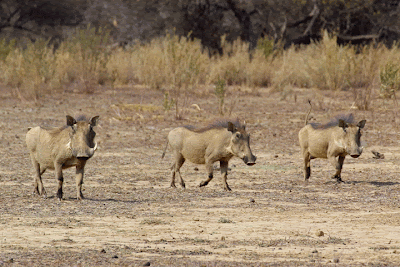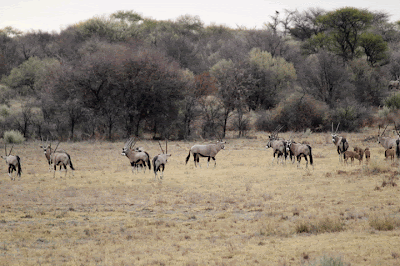As we flew into Windhoek, Namibia on the opposite side of the African continent, we saw a 100% change in the environment. Dry, arid, brown and gray, the river bed baronly empty. The country is in drought, the rains didn't arrive like normal last year. It was just turning spring while we were visiting the country, residents anxious for the rainy season to arrive.
 |
|
It didn't take long to leave the paved road as we traveled toward the farm we would be hunting - 25,000 hectares (61,776 acres) of African bush - dirt, THICK thorny brush, deeply rooted trees, very little grass as the weeds have taken over. The owners of Makadi Safaris also raise cattle, as most farms in Namibia do, but honestly, I don't know what the cattle - or the game - were eating. To say the land was over grazed would be a bit of an understatement. What they did have lots of was game and predators. The amount of predators becoming quite apparent by listening to the jackals serenade us at night. (At right, a kudu cow comes out from the brush only to ghostly disappear back into the brush across the 'road'.)
The air and land was so dry that at the end of the day we would be covered in dirt and dust, noses full of dust and pollen as the trees were beginning to bloom. I kept saying that breathing was highly over-rated, but no one understood my humor. Many, many dry wells on the ranch; a few good ones, but mostly dry wells. No point in continuing to drill wells when you hit nothing. Water a huge concern as the natural "lakes" which were mere stock ponds were quickly drying. No garden would be put in at the ranch this year not knowing how Mother Nature is going to treat them this rainy season. The ranch was currently in conservation mode, everyone bathing a little less frequently, more beer than water being consumed. Don't judge........beer is far less expensive than buying bottled water.
Most of the week would be spent driving around the bush in an open bush buggy, a short
 |
| Paulous driving the bush buggy. |
wheel-based, 4WD, cabin gone, open benched, go any where 1970's old Toyota Land Cruiser. A little top heavy? Yes. Will it go where you want it to? Yes. The perfect Bush hunting vehicle. Our driver, Independence, a native, a new employee at the farm, speaking virtually no English, very eager to please not only our guide, but also us.
Our guide, Bernie, was the epitome of a hard-working entreprenurial spirit, guiding not only for Makadi and other outfitters, but also has a small outfitting business of his own. Bernie also has a meat culling business - property owners having to much game on their land call him, he culls the animals, he and his partner take care of the meat, then sell the meat to the local Spar butcher counter. Then in his spare time, he is a self-employed welder/mechanic and cattle rancher. A busy guy indeed, and still manages to make time for his wife and baby girl.
 |
| Sunrise at the ranch. |
On day 3 a regular driver, Paulos (also a native), took over as our chauffeur. Paulos spoke little English, but understood a good amount. Namibia definitely has a class system, as most of Africa I believe does; neither of our drivers would sit on the bench with Bill and I until invited. They would crawl in the back of the jeep, a "seat" to sit on, no floor board and literally hang on with hand, feet, toes - whatever appendage available! Everyday, Paulos would bring the jeep around to our guestroom at 6:30am sharp! When it was time to take a coffee mid-morning, he would break out the folding chairs, and folding table placing them in our blind for us to sit comfortably. If we were using a natural blind, he carried a machete with him that he would cut branches down with to open shooting lanes and also build up cover where needed. All of the labor, Paulos doing. No one is being rude not helping, this is how life is done and how life is expected to be.
 |
| Our first days lunch, served in the bush! |
Each day our laundry was 'magically' collected and just as in Mozambique, was washed, air dried, pressed and folded to be returned to our room prior to us returning to camp for the evening. Our room made up each and every day. Daily lunch consisted of a fresh baked loaf of bread for sandwiches, an assortment of salami's and cheese, along with the standby peanut butter! Not to mention usually some left overs from dinner the night before were packed up and sent to the bush with us to be served on that table and chairs I was speaking of earlier....only complete with a table cloth. The cooks prepared game meat for us each night, gemsbuck, ostrich, wart-hog, roan. A-L-L good stuff! When we would bring a harvested animal in at the end of the day, as we passed by the 'employee village', we would honk the horn of the jeep and 3-5 guys would meet us at the meat rack to hang and dress the animal. Nothing going to waste. When they would dress the animal, a wheel barrow was placed at the bottom of the animal to catch the innards so they could make their delicacies. Bernie told me at one point, if they field dressed the animals as we do in America, the land owner would be in "big trouble with the natives". Skinners would come in to cape the animal and skin it for the taxidermist. A bushman worked in the skinning shed with, as I understand, his job being to boil off the skull and prepare the hide and skull for transfer to the taxidermist. (Bill thought he finished a cigarette and threw it into the fire pit - that wasn't burning at the time - only for the bushman to scold him for being wasteful. He picked it out of the ashes to finish the last two drags off that smoke. NOTHING is wasted in the bush.)
The 'employee village' was behind the main ranch complex. Some of the homes had families living in them, some had single guys or gals living in them. The kids played in the 'street' (which was simply what American's would consider a courtyard) barefoot. (Somethings are the same the world over.) Jerky makings would hang from the porch drying in the sun. No dehydrators needed - the sun does the job 100% and it's pretty good stuff too! The ranch employed people to not only work domestic chores, be drivers or skinners but also to work the cattle ranch side. Diethelm & Katja raise award winning cattle so they have people to train the cows for showing, herdsman to tend to the goats and cattle, fix fence, and just everyday hired hands. It takes a lot of people to make 25,000 hectares run efficiently!
 |
| Paulos: driver, tracker, awesome guy. |
Not only was Paulos our driver, but our tracker too. The springbok I shot had to be tracked for quite a distance, Paulos and Bernie stepping up to get the job done and get the job done they did. We Americans can learn from these guys. The blood trail was lost, and these two awesome guys tracked a single track amongst countless other tracks to recover the animal. Neither Bill or I have EVER seen anything like it. (The hierarchy order became very apparent during the tracking process. Bernie the lead, a PH intern 2nd (employed by the ranch we were hunting on), Paulos 3rd and me last. The intern wasn't worth much so purposely - I believe - lead away from tracks to keep him out of the way.) Paulos tracked the animal while Bernie looked ahead for the animal, eyes get tired looking at tracks, so Paulos would back-track to pick it up again, or Bernie would pick it back up. Once we found the animal, Paulos was last and the sneak was on.
Not one time during any part of our trip, did anyone give us the "woe is me, I am poor". It was quite refreshing to be in a 3rd world country and not have anyone begging us. Bill being far more exposed to this than I. I am very impressed with the work ethic of everyone we came in contact with on this trip, but then, when you live in the bush - be it Namibia or Mozambique - you have two choices in life: work hard or go hungry. There is no place for handouts in the bush.
Unable to catch a flight home for a couple days after leaving the farm we stayed in town at Hotel Thule - first class, you ask? In a word, Y-E-S. Our room was bigger than our bedroom in our home, the bathroom complete with a jaquzzi tub and separate giant shower, heated towel rack, the rate including the mini-bar in the room and a buffet breakfast exceeding belief. Dinner on the Terrace was beyond reasonably priced. The view? You decide. The staff in the hotel, very friendly yet professional most speaking English quite well. Our waitor quite attentive, but not overly. An awe-inspiring evening to end our adventure, for sure.
 |
| View from the Terrace - the city of Windhoek. |


















































